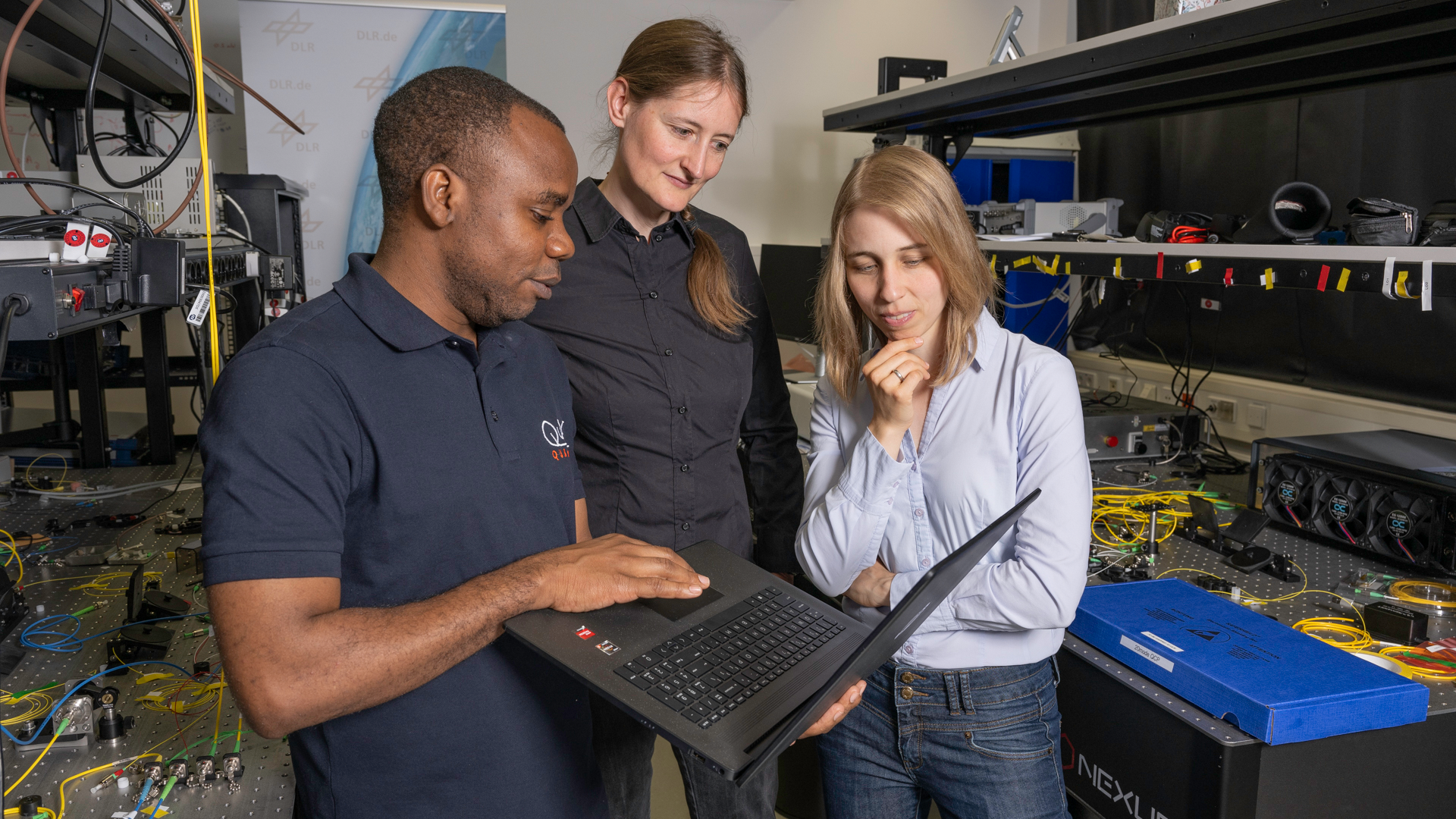Into the world of practical applications

The last few years have seen great advances in quantum computers. But if these new computers are to realise their enormous potential in practice, developments in applications must keep pace. This presents a double challenge.
Quantum computers are able to solve certain mathematical problems more quickly or efficiently than classical computers. This has been proven theoretically, but the proof for practical application is still lacking: The hardware is simply not yet ready. The second challenge is the step into practice: research, industry and business must be able to identify practically relevant opportunities for quantum computing and implement them in the new hardware. This is anything but trivial. Both proof of usefulness and actual applications are required if quantum computers are to find their way into use. This is the only way to create an innovative environment for quantum computing that brings forth internationally competitive hardware and applications – and thus a functioning market.
Within the DLR Quantum Computing Initiative (DLR QCI), development teams from DLR and industry are therefore working together to identify practical use cases and implement them in the first functioning quantum computer. The close cooperation with stakeholders from industry ensures that the development takes into account the practical needs of future users.
Particularly important here is the close proximity to the hardware start-ups that are building the first quantum computers for the DLR QCI at the innovation centres in Hamburg and Ulm. This parallel – and often joint – development of hardware, software and practical applications, the outstanding technical infrastructure and the cooperation between industry, start-ups and research make the DLR QCI truly one of a kind. And it shows that quantum computing is on the verge of practical application.
This presents great opportunities and challenges for industry, society and research, which they should prepare for in good time. The DLR QCI supports this by sustainably strengthening the German quantum computing industry, building up expertise and specialist personnel and thus ensuring sovereign access to a technology that is likely to be revolutionary.
QLearning and eleQtron

eleQtron
Quantum processors for reinforcement learning
Machine learning is revolutionising information processing. Most approaches are concerned with identifying patterns and structures in large amounts of data. In 'reinforcement learning', on the other hand, a so-called agent searches for the right solution to a given problem. This approach has applications in many scientific and industrial fields, including navigation, biology and energy supply. Quantum algorithms have the potential to accelerate the learning process. Sabine Wölk from the DLR Institute of Quantum Technologies is collaborating with industry to identify which quantum computers are best suited for this task. With direct hardware access at DLR QCI, Wölk can closely collaborate with hardware manufacturers to research, develop and test this approach for real-world applications.
"I provide the theoretical background knowledge, and the start-up contributes the hardware expertise. Together, we are advancing quantum computing."
Sabine Wölk, QCI QLearning project, DLR Institute of Quantum Technologies
QMPC and E.ON

Quantum Mission Planning Challenges
Quantum computers can solve certain optimisation tasks much faster or more accurately than classical computers. The so-called timetable problem is notoriously difficult: how do you arrange certain activities in such a way that they optimally fulfil a large number of constraints? The QMPC project is researching two practical use cases for this type of problem: Sven Prüfer from DLR's Space Operations and Astronaut Training facility in Oberpfaffenhofen would like to use quantum computers to plan space missions – which often entail time-critical and mission-relevant decision-making. And Corey O'Meara from energy supplier E.ON is researching the efficient integration of electric vehicles into the power grid of the future – even the smallest efficiency gains can have major positive consequences.
"We are driving the energy transition with quantum computers."
Corey O'Meara, Chief Quantum Scientist, E.ON Digital Technology
BASIQ and HQS Quantum

Battery material simulation with quantum computers
Quantum systems are best simulated on quantum computers. Materials research and development is likely to be the first area to see tangible benefits from quantum computers. In the BASIQ project, Birger Horstmann from the DLR Institute of Engineering Thermodynamics, and Michael Marthaler from HQS are utilising the susceptibility of the first quantum computers to errors to develop more efficient battery materials. Horstmann and Marthaler are deliberately using this 'noise' to simulate external disturbances to which a quantum system would be exposed in a real battery material. In this way, one of the weaknesses of the first quantum computers is turned into a strength that can be used to research the potential of this innovative approach.
"Quantum computers provide entirely new opportunities for developing novel materials and active substances."
Michael Marthaler, Managing Director, HQS Quantum Simulations
QUANTITY – Looking for industry participation
Quantum-assisted cryptanalysis
The projects of the DLR QCI are regularly on the lookout for industrial participation. One such project is QUANTITY. In this project, the DLR Institute of Communications and Navigation is investigating the security of digital encryption systems capable of resisting quantum computers. Quantum computers have the potential to crack widely used cryptographic methods for digital key exchange and signatures. Sensitive data stored today could be decrypted in the future, once powerful quantum computers become available. It is therefore crucial for researchers to gain a deeper understanding of this risk in order to develop new, more secure methods. The QUANTITY project supports research and industry in better assessing the security of novel, so-called quantum-proof encryption systems, enabling them to develop cryptographic methods that can endure in a world with quantum computers.
"We want to understand the risk that quantum computers pose to quantum-proof encryption systems – and improve them."
Hannes Bartz, Research Group Leader 'Quantum-Resistant Cryptography', DLR Institute of Communications and Navigation
An article by Felix Knoke from the DLRmagazine 176
